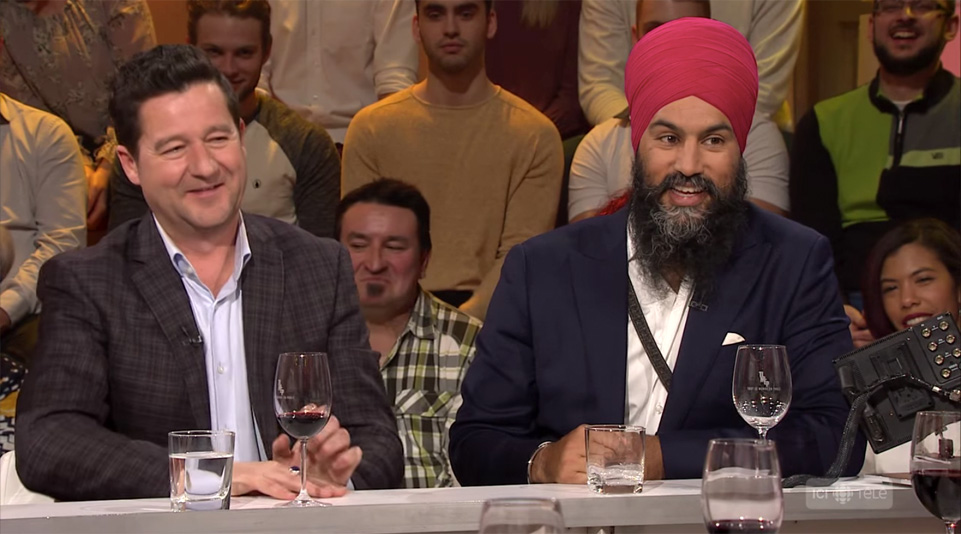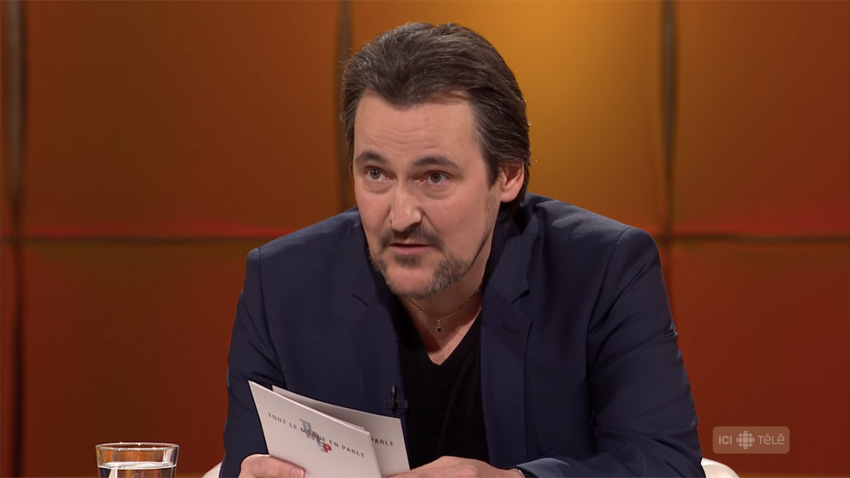
This Sunday night at around 8 p.m., it’s a safe bet that hundreds of thousands of Quebecers, perhaps a million or more, will turn on their TVs or pop open a browser window to watch two former comedians share a bottle of wine with entertainers, athletes, politicians, citizen activists, and the occasional hypnotist. The resulting conversations will light up francophone Twitter and become fodder for Monday-morning water-cooler conversations across Quebec. Journalists for major morning papers and websites will analyze the show as if it were a leaders’ debate.
The talk show in question, Tout le monde en parle (Everyone’s Talking About It), has no real equivalent in English Canada. Influential columnist Patrick Lagacé has called it “Quebec’s TV confessional.” Public figures submit to a long line of questioning from former comedian Guy A. Lepage and his sidekick Dany Turcotte, the fou du roi (court jester). The Radio-Canada show’s mix of wide-ranging interviews, spontaneous debates, off-colour humour, quirky rituals (Turcotte gives each guest a personalized one-liner written on a card at the end of their appearance), and five-hour recording sessions with strategically placed alcohol makes it unique.
“We have nothing like it in English Canada, and it can make or break a politician,” says Brad Lavigne, a former NDP strategist who was with the party when Jack Layton made a much-hyped appearance on the show in 2011. “It had a tremendous impact on our [party’s] campaign.”
“The [guest list] balances people who have been in the news in the past week and people who are less high-profile,” says Université de Montréal political communication professor Frédérick Bastien. “Most of the [guests] are from art and culture, but there’s usually at least one public affairs item, with a politician, an academic, or a journalist who has broken an important story.”
Tout le monde en parle — “TLMEP” for its devotees — was originally adapted from a concept that had been successful in France. Its first season was in 2004, and its renewal for a fifteenth season was announced on air March 11. “After 14 seasons, it’s still drawing about a million people [each week],” says Bastien. “Considering the fragmented media landscape we have, that’s exceptional. It’s a huge opportunity if you’re a politician or a spokesperson for a cause.”
Although not all of the show’s two-hour-plus episodes feature a big political interview, Université Laval communications professor Guylaine Martel observes that those are the ones that get the most viewers. “Quebecers have two national sports, politics and hockey,” she says. “I don’t know if anglophones are quite so fascinated by [domestic politics].”
A good performance on TLMEP will stick in the minds of voters, and a bad one will take a long time to wash away. “The coverage it gets in the morning papers and websites amplifies its reach,” Bastien says. La Presse, Le Soleil (and its sister papers in smaller cities around Quebec), HuffPost Québec and the popular free daily Metro Montréal publish summaries of the show the morning after it airs, and its particularly contentious debates often spill over into other media outlets. “Everyone is talking about it” is of course an exaggeration — but not by much.
For aspiring leaders, TLMEP can be their biggest chance to win over a Quebec audience — not to mention the most high-stakes French test of their careers. Layton’s charming performance on the show in 2011 was widely credited with lighting the spark that led to his party’s massive gains in Quebec later that year. New NDP leader Jagmeet Singh got “the star of the match” from Le Soleil television critic Richard Therrien earlier this month for a “successful charm operation,” which stood out even more compared to the defensive performance of visibly exhausted Bloc Québécois leader Martine Ouellet on the same episode. Singh couldn’t have asked for a better mise en scène.

On the contrary, Canadian Heritage Minister Mélanie Joly’s robotic defence of the federal government’s tax agreement with Netflix in late 2017 “bogged her down even further,” in Therrien’s words. It was relentlessly savaged in the French-language press and contributed to growing media disenchantment with the Liberals.
One peculiarity of the show is Lepage’s catchphrase at the end of each interview — “Vous restez avec nous? (Are you staying with us?)” Guests are invited to stay on set and add their own perspective to each subsequent interview. Although guests who go on early in the show get off relatively easy (Layton was the first guest; Singh was surrounded by young Olympic athletes who seemed to pay attention only periodically), others end up submitting to rigorous and unexpected cross-examination from fellow guests. When Joly appeared on the show, she had the misfortune of being surrounded by financial journalists Gérald Filion and Pierre-Yves McSween and TV producer and entrepreneur Julie Snyder, all of whom seemed to know more about the intersection of fiscal and cultural policy than she did. “That was a tough week for Joly, and she just made everything worse,” recalls Therrien. “She kept repeating herself, and it really impacted the image people had of her. That’s one example of how an interview can bite you.”
To succeed on the show, guests have to be prepared to talk policy, but also to laugh at themselves and stickhandle through some potentially awkward moments, deliberately (and gleefully) engineered by Lepage and Turcotte. Layton, appearing on the show shortly after being diagnosed with prostate cancer, was asked a question about the link between masturbation and prostate health, to which he answered, “I’m with my wife tonight.” Singh responded with similar grace to an off-colour joke about media interest in his wedding night.
“Are we going to have an Instagram story at three in the morning? No pressure or anything,” Turcotte cracked.
“I don’t feel the pressure,” Singh said, laughing along with the blushing Olympic athletes. “But [balancing our public and private lives] is something we’ve talked about.”
The show has come under some criticism for focusing more on fluff than policy, but Bastien doesn’t see it that way. “On one hand, [the highly personal nature of the show] seems to increase the confidence that less politicized people have in politicians,” he says. “They think, so-and-so is kind of like me, so-and-so is a grandparent… but some people who are more engaged see it as avoiding the issues.”
“Studies have shown that shows like this are important because they allow us to get to know the person,” says Martel. “The person’s honesty and fidelity to their own ideas is important; so is whether they seem to be there for the right reasons. Also, it’s more friendly than a leadership debate; it’s a long interview, and the politicians are comfortable giving longer answers.”
“There’s no real preparing for it,” says Lavigne, the former strategist. “You can’t be scripted…you have to be entertaining, but you also have to know the issues.”
Tout le monde en parle is “kind of like the Rick Mercer Report, in that you can’t be afraid to laugh at yourself…and you have to have a certain knowledge of pop culture,” Bastien says. “Jack Layton was very good at that format, [former Liberal leader] Stéphane Dion not so much. He was like, ‘Do I have to?’”
Although Dion eventually took up the challenge, former prime minister Stephen Harper never went on the show. Harper’s laborious French might have had more to do with that than his tense, formal persona. An anglophone can’t go on Tout le monde en parle without having his or her language skills evaluated — by Therrien, other critics, and thousands of people on Twitter. Although Singh, a turbaned, practicing Sikh, is arguably fighting an uphill battle in secular Quebec, his surprisingly sure-footed performance in French on the show can only help.
The show’s actual effect on voter tendencies is difficult to pinpoint; no specific studies have been done. “We tend to overestimate the impact of media on voter tendencies to begin with,” says Bastien.
“I don’t want to talk about the show’s impact on the election just yet, when we’re 18 months away,” says Lavigne, who is no longer directly involved with NDP strategy. “As an introduction, though, [Singh] did very well because he came across as comfortable in his own skin. It was a strong performance, and it made a lot of people think.”
At the end of the interview, Turcotte handed Singh a card with an original one-liner written on it, a TLMEP tradition. The cards can be biting or encouraging. “If you want to recreate the Orange Wave,” Turcotte had written, “pull a rabbit out of your hat and name it Jack Layton.” If Singh does pull the rabbit out, he may look back on TLMEP as where the magic first happened.
Top image: TLMEP sidekick Dany Turcotte with NDP leader Jagmeet Singh.